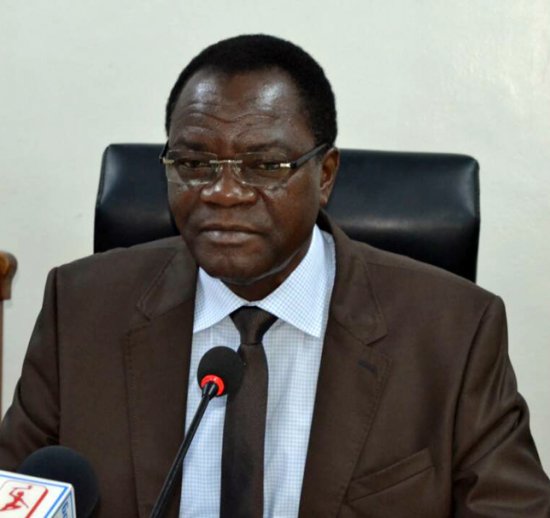The 23rd Session of the Conference of the Parties (COP23) of the United Nations Framework Convention on Climate Change (UNFCCC) held in Bonn, Germany from November 6 -17 2017, provided the framework for the launch of the UCLG Africa Climate Task Force and the presentation of its members to the political authorities and the general public.

The official launch of the UCLG Africa Climate Task Force was held in Bonn on Tuesday, November 14, 2017 under the chairmanship of Mr. Barnabé Dassigli, Minister of Decentralisation and Local Governance of Benin, Chairman of the Specialised Technical Committee N° 8 of the African Union, in the presence of representatives of the first institutions that volunteered to join the Task Force. These were notably:
- The African Development Bank (AfDB), represented for this purpose by Ms. Louise Helen Brown, Climate Change Task Manager, Coordinator of the AfDB Fund for Climate Change in Africa;
- The West African Development Bank (BOAD), represented by Mr. Bio Sawe, Director of the Environment and Climate Finance;
- The Local Government Capital Investment Fund of Morocco (FEC);
- The Special Fund for Equipment and Inter-Municipal Intervention of Cameroon (FEICOM), represented by Mr. Côme Awoumou, Deputy Director of Cooperation and Partnership;
- OECD, represented by Ms Marie Trémolières, Senior Policy Analyst at the Sahel and West Africa Club (SWAC) of OECD;
- The Environment Agency for Territorial Development of the Presidency of the Republic of Benin, represented by Mr. Jean Claude Grisoni Niaki, expert in resource mobilisation and structuring of projects for Climate Finance;
- The 4C Agency of the Ministry of the Environment of Morocco, represented by its Director, Mr. Mohamed Nbou;
- Cadi Ayyad University of Marrakech, represented by Professor Fatima Arib, Sustainable Development and Major Projects Task Manager at the Presidency of the University;
- The National Associations of Local Governments in Africa, represented by Ms. Florence Radzilani, Mayor of the Municipality of the District of Vhembe (South Africa), Climate and Environmental Planning Officer at the South African Local Government Association (SALGA);
- NGO ENERGIES 2050, represented by its CEO, Stéphane Pouffary.
Jean Pierre Elong Mbassi, Secretary General of UCLG Africa, stated the intention of the Task Force to bring together, within the same ecosystem, the various stakeholders working with climate issues. This is to enable them to support local governments in Africa in the implementation of NDCs and in the access to climate finance and most notably the Green Climate Fund. This is open to all those who wish to join it who can do so by applying to the General Secretariat of UCLG Africa.
On behalf of the African Ministers of Public Service, Urban Development, Local Governments and Decentralisation, the Minister Barnabé Dassigli of Benin, Chairman of the Specialised Technical Committee N° 8 of the African Union, commended UCLG Africa for its wonderful initiative, supported by STC N° 8.
He expressed confidence that the UCLG Africa’s Climate Task Force would have a significant impact on the engagement of African local governments in the implementation of the Paris Agreement and pointed out that within the same support platform for local governments, development banks, institutions specialising in the financing of local governments, technical support agencies for local governments, academic and research institutions, associations of local governments and NGOs active in the field of climate, was a commitment to the synergy of the different stakeholders around the Climate Agenda.
Dassigli confirmed that the African Union’s STC N° 8 also supports requests made by local and regional elected officials during the preparatory Forum for COP 22 held in Cotonou in September 2016, especially with regard to the urgency of establishing a capacity building and technical assistance program for local governments to enable them to develop climate plans and prepare eligible funding applications for the Green Climate Fund; as well as for the recognition of UCLG Africa as an “Implementing Partner” of the Green Climate Fund.
The role of territories was recognised as essential for the realisation of NDCs (Nationally Determined Contributions). Local policy choices in terms of infrastructure, equipment and basic service delivery methods have made an impact on energy efficiency and greenhouse gas emissions. Priorities for elected officials include giving a climate perspective to the everyday actions they carry out. There is also a need to build their capacities to measure, report and verify the contribution of their actions and policies in the reduction of emissions and adaptation to the effects of climate change.
This requirement for the Measurement, Reporting and Verification of climate actions (MRV) is one of the requirements of the Paris Agreement and one of the conditions to be met in order to access the Green Climate Fund. The National Associations of Local Governments will be required to advocate with the representatives of the NDC Partnership and the focal points of Green Climate Fund in their respective countries.
